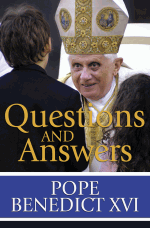 I just finished Questions and Answers by Pope Benedict XVI put out by Our Sunday Visitor which is a collection of various question and answer sessions from various audiences that includes sessions with children, youth, and clergy at multiple locations. This s a very worthwhile collection and with the amount of these type sessions I am sure we will see more of these books in the future.
I just finished Questions and Answers by Pope Benedict XVI put out by Our Sunday Visitor which is a collection of various question and answer sessions from various audiences that includes sessions with children, youth, and clergy at multiple locations. This s a very worthwhile collection and with the amount of these type sessions I am sure we will see more of these books in the future.
Pope Benedict XVI really opens himself up to these types of sessions which I think for the most part of quite unique in the history of the Church. The questions themselves are interesting, but it is the way the pope answers these questions in his own style that is quite remarkable. Reading through his sometimes lengthily answers you would think he had days to work on responses to questions put before him ahead of time. He is an amazing extemporaneous speaker and his answers reveal just how thoroughly he has integrated the faith and is able to speak on almost any topic to reveal his knowledge and contemplation on a subject. It is obvious as to the level of detail that he has given to these subjects in his own mind before hand.
I also found it quite amazing his ability to really answer a question and put together a synthesis of Church teaching and his own practical experience to give almost a mediation on a question. The book opens up with questions from children and I think they way he answers them is the very model that people working with children and youth in regards to religious education should follow. He is able to answer serious questions to them in a serious manner that does not "talk down" to them, but at the same time making it understandable to them. He sees no reason to water down a serious subject just because he is talking to children and is able to tailor it to their intellects in such a way that even as an adult I found his answers fruitful for me.
His answers, especially to fellow priests, are often long discourses – but he doesn’t talk just to hear his voice. In one question he felt that the questioner had answered his own query and the Pope simple said for other to listen to what this priest had to say and not feel the need to add anything to it. You get the feel of his real humility when he answers questions in that he defines the limits of what he is able to answer and when speaking to clergy talks about their pastoral experience in taking his suggestions in.
The questions run the gamut and some of them overlap. I especially enjoyed his discussions on marriage and his insight in regards to marriage. I loved how he referred to one large family as a parish. Some of his answers in regard to science are quite interesting especially in regards to the recent controversy and protests at the La Sapienza University in Rome calling the Pope anti-science. In on answer he talks about Galileo the great and the proper and supporting roles of faith and science. In another he talks about the false tensions between creationists and evolutionists and where they both go wrong and makes a fairly strong statement in regards to the science of evolution. When Pope John Paul II made a comment about evolution it got a lot of press and so I find it rather strange the Pope Benedict’s comments in this regard did not get the same publicity. I guess it didn’t fit their template.
This book was edited by Michael Dubruiel and the Latin translation footnotes were provided by Fr. John Zuhlsdorf which as you would expect are quite informative.
